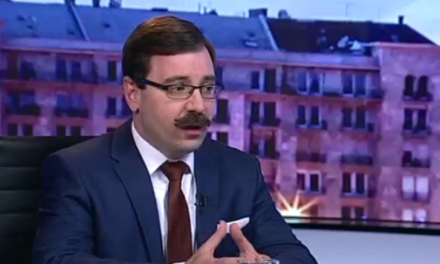A system as complex as healthcare cannot be made flawless in one fell swoop with just money. Written by Zsófia Ambrus-Jobbágyi.
I am a member of a Facebook group that brings together women who gave birth to their child in the maternity ward of a Budapest hospital. The group is moderated and closed, the essence of which is that the members can honestly ask and report on the conditions, the doctors, the infant ward, and all important details, both to each other and to the expectant mothers who are preparing to attend. I think almost every hospital has a similar group in maternity or special departments, so it is definitely not a unique case.
The bottom line is that whoever wants to know whether it will be good for him and his baby to start the first days of their lives together in that hospital, despite the group, will not really have an objective picture of the work and conditions there. And the reason for this is that as many mothers, so many perspectives and experiences have been collected over the years about the various doctors, the conditions and condition of the rooms, the midwives, the babies, and I could go on and on. For example, there was someone who reported that he would be forever grateful to the staff in the infant ward because they taught him everything with patience, love and maximum attention without him having to ask.
However, there was also someone who felt abandoned, because no one opened the door for him during his stay, and he had to solve everything on his own. There were those who sang odes about the same doctor, and there were also those who warned against him. One mother also reported that she couldn't open the window in her room because it was stuck, and by the third day she was there, the air was so dry that her nose was bleeding. According to another, the wards were flawless and clean, beautifully painted and far from ideal.
We are talking about the same department and staff of the same hospital, but also about so many points of view, aspects, feelings, impressions, different orders of importance and changing circumstances.
After all, wherever people work, and with human lives, the attention of the workers there can never wane, and the maximum is always expected of them: even though they are also human, they can have a bad day, make mistakes, react poorly, be exhausted or simply unmotivated; these are all components of the quality of a hospital, and even more so of a workplace community, and thus also of its perception. Beyond material circumstances.
Well, how does it come here now? Péter Magyar wrote on his social media page that he and the Tisza Party are visiting hospitals, quasi-checking the condition of the institutions. I don't really understand the attitude in the first place: the president of the party seems to feel competent in everything, and gives the impression that he will now clean things up everywhere and tell the truth. Speaking of which, his most interesting feature is the fake government info, which he also hosts, almost reporting on the big things in life. This creates a somewhat parodic impression only because the real Government Info is run by members of the government, Gergely Gulyás points out, who reports on the real decisions and plans, giving every existing body and journalist the opportunity to ask their questions week after week. Because he is the minister in charge of the Prime Minister's Office, who has real authority to do so. Péter Magyar, on the other hand, is the president of an opposition party, who is neither a member of the government nor makes decisions about the lives of the Hungarian people, so what he does under the title of "government information" is completely self-serving. But at least he's enjoying it.
Returning to healthcare, during his visit to the hospital he also visited the hospital in Péterfy Sándor Street, where he claimed the gate was locked, where he measured 38 degrees with his thermometer, the intimidated doctors and workers cried when they saw that he had finally arrived and begged him, to inform the public about what is going on there. However, the people of the tyrannical government did not allow the independent press to finally show the truth.
Then the institution issued a statement in which they painted a slightly different picture of what happened. According to them, it is not true that Magyar was not allowed into the institution, because his video shows that he is inside the building, and the chained door was only closed for a few minutes, because as soon as the hospital management found out about it, it was immediately opened. What was claimed about the indoor temperature was also described as misleading, because according to the institution, Magyar measured the temperature of the walls, not the air, so what he claims is slippage.
I don't know if it's just me, but why is it that whatever this person says, about anyone or even his own actions, is always refuted in some form by the person concerned? This is certainly thought-provoking. But as the public has already witnessed several times, Péter Magyar always likes to bend reality a little in the direction that favors him.
and he usually sticks to his obviously false claims to the bone and mostly points to Antal Rogán.
Don't get me wrong, the purpose of this article is not to claim that the healthcare system works flawlessly and that all criticism is a lie. This is not so. At the same time, it is also certain that even in the most developed and richest western states, campaigning on the health care system is a very rewarding topic, because it is possible to find weak points everywhere, and it is possible to flaunt in front of people that lam-lam, the reigning government is throwing a fit for the fallen and sick people, but then the next one will solve all problems in one fell swoop!
But before I try to explain why, let's dig a little deeper into the numbers. The hospitals' air conditioning equipment has been systematically measured over the past three years, and based on this, more than ten billion forints have been spent on modernization, replacement, and installation of units throughout the country. Despite this, of course, it may happen that the constant 35-40 degrees outside does not spare the wards either: according to the state secretary of health, the electrical network is to blame in many places, which cannot always withstand such persistent heat.
By the way, Péter Takács also reacted to the general heat prevailing in the János hospital, according to him, it only affected the orthopedics, from where the patients were already transferred to the brand new Kútvölgyi block, which was completed not so long ago.
Péter Magyar also mentioned that hospital debt settlement takes place every year, and the government has paid out almost HUF 100 billion for this so far this year, and it will do so every year. Of course, there are articles about the collapse of the system and the bankruptcy of institutions, but the truth is that this has never happened. Just as the government implemented an unprecedented wage increase for doctors, as well as for skilled workers, many rural hospitals were renewed in the previous EU support cycle, as were a significant number of those in the capital, including specialist surgeries. Of course, there are a lot of errors and old outdated hospitals that are waiting for complete renovation. There is also a shortage of GPs and skilled workers, as well as bad climate and unbearable heat.
But to compare this with Viktor Orbán's vacation in Croatia and to say that this government just sits on its billions and does nothing for the sector is very strong slippage and political gain.
And to promise Péter Magyar that if he is elected, he will solve everything in one fell swoop with hundreds of billions, is the biggest lie. A system as complex as health care cannot be made flawless in one fell swoop with just money. It can be reformed systematically, at the system level, step by step, which is visibly and perceptibly ongoing. It's just that it's easy to live in a T-shirt with a Tisza logo and say big things. Taking action and actually making a change is much more difficult.
Featured image: Péter Magyar/Facebook













